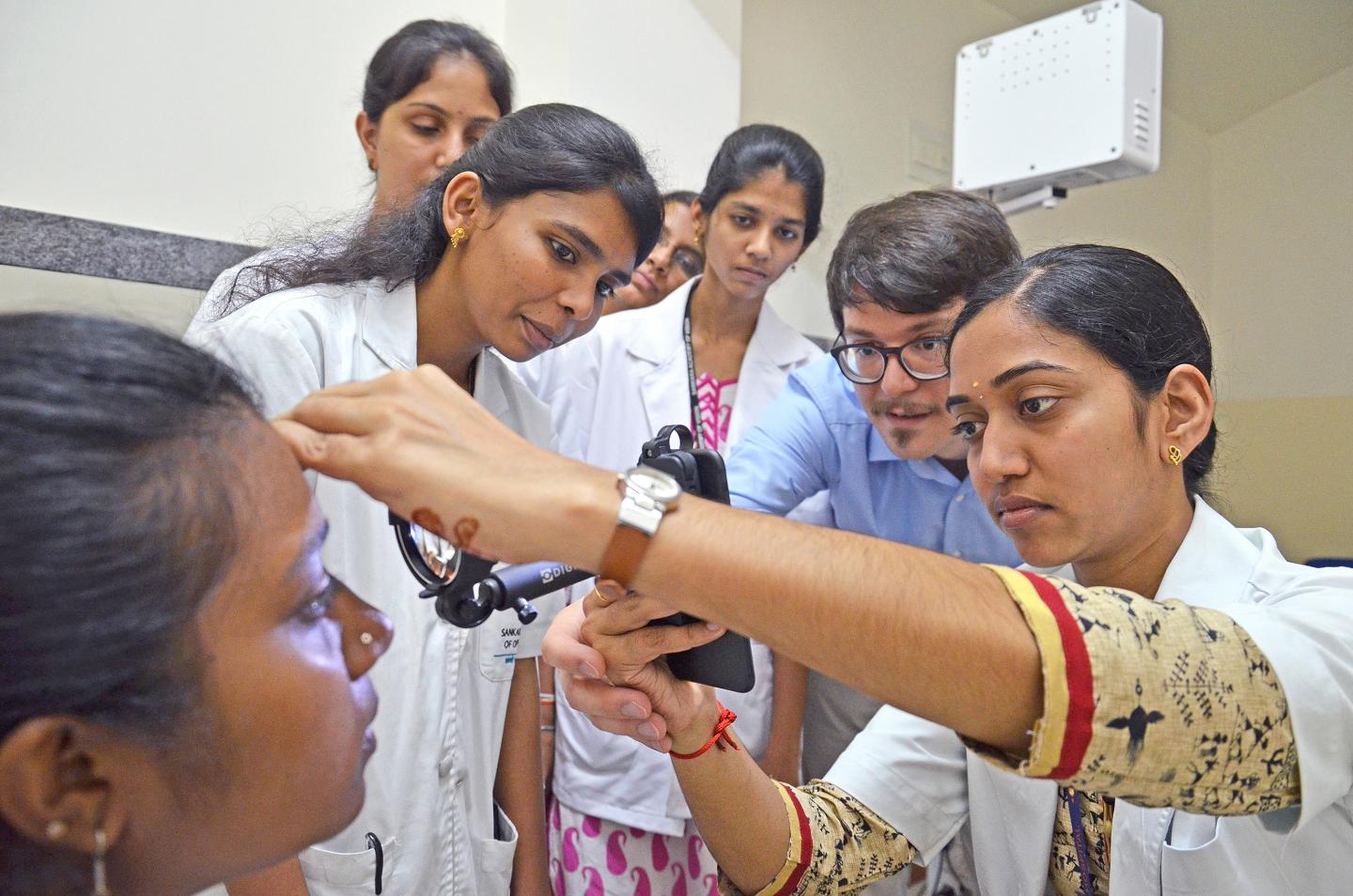Cost-effective telemedical eye screening of people with diabetes in India

Credit: © Augenklinik / UK Bonn
About one in ten people in southern India is diabetic. Around one in three suffers from a so-called diabetic retinopathy (DR), a disease of the retina caused by diabetes. Untreated, DR is often the cause of visual impairment and blindness. However, many of those affected have symptoms only in the late stages of the disease. Early detection is therefore all the more important in order to intervene in good time. But ophthalmic care for diabetics living in rural India or in poorer areas of the cities is insufficient. For this reason, the Eye Clinic at Bonn University Hospital, and the Sankara Eye Foundation – India, have started a collaborative project to introduce unique smartphone-based telemedical DR screening. This is funded with around 50,000 Euros (56,000 US Dollar) by the Federal Ministry for Economic Cooperation and Development and the Else-Kröner-Fresenius-Foundation over two years as part of a clinic partnership.
DR is the most common cause of blindness in working-age adults worldwide. Millions of people in developing and emerging countries are at risk of impaired sight due to a lack of early diagnosis and treatment. “So far, however, there have often been no examinations to diagnose diabetic retinopathy in developing and emerging countries,” says Dr. Maximilian Wintergerst, physician at the Eye Clinic of the University Hospital Bonn and director of the project in Germany. “An affordable and easy-to-use screening procedure for early detection would be very helpful in improving ophthalmic care,” explains Prof. Robert Finger, co-director of the project. The ophthalmologists in Bonn see a possible approach in smartphone-based funduscopy.
“We use the smartphone’s camera to look into the eye.”
Two years ago, they tested this highly mobile and inexpensive method of fundus photography in a pilot study together with the Sankara Eye Foundation in southern India. Together with the team from Sankara Eye Hospital in Bangalore, Wintergerst examined 200 patients with diabetes. They took pictures of patients’ eyegrounds with retrofitted smartphones. This is done by using an adapter to focus the beam path of the camera and the light source in such a way that the mobile phones can be used as ophthalmoscopes. The result of the study was that ocular fundus examination is possible with all four tested smartphone-based procedures. “We therefore have an easily accessible and very cost-effective process,” says Dr. Wintergerst.
The aim of the two-year grant is to establish telemedical DR screening in poorer districts of Bangalore and the surrounding rural areas. The smartphone ophthalmoscope is quickly and easily assembled so that trained, non-physician staff can take pictures of a retina even when they are not in a medical center. An additional saving effect is achieved by the fact that an ophthalmologist can directly evaluate the images sent from the smartphone to the hospital via the Internet. This makes it possible to immediately report back whether the patient has DR and treatment is necessary.
Establishment of eye screening by telemedicine in India
Wintergerst was recently in India for one week to make first preparations at the Sankara Eye Hospital in Bangalore together with Dr. Kaushik Murali, President Medical Administration of the Sankara Eye Foundation, and Dr. Mahesh Shanmugam, the director of the project in India. He also began training 20 optometrists in smartphone-based funduscopy. “What is important to us is a sustainable transfer of knowledge so that telemedical screenings can be continued in the long term after the end of the project,” says Wintergerst. In addition, six ophthalmologists and employees of the Sankara Eye Hospital Bangalore will travel to the Eye Clinic of the University Hospital Bonn. At the GRADE Reading Center Bonn that is located there, local experts for systematically standardized image analysis will introduce Indian colleagues to the special requirements of evaluating images of the fundus of the eye taken with a smartphone and they will also share their know-how on the operation of a telemedical reading center.
Wintergerst will travel to South India several times over the next two years to supervise the training at the Sankara Eye Hospital and the screening camps. If everything works as planned, he has a great vision together with the collaboration partners from India: “An extension of the telemedical DR screening program to other hospitals of the Sankara Eye Foundation with the telemedical reading center established in Bangalore as the coordinating center. This could significantly improve eye care for many people with diabetes, especially in rural areas with poor medical infrastructure.” He also sees the potential that this telemedical screening concept, if successful, could be transferred to other emerging and developing countries.
###
Media contact:
Dr. Maximilian W. M. Wintergerst
Resident, Eye Clinic at University Hospital Bonn
Prof. Dr. Robert P. Finger, PhD
Professor for Ophthalmic Epidemiology and Neuroretinal Imaging
Eye Clinic at University Hospital Bonn
Telephone: +49 228/287-15505
E-mail: [email protected]
Media Contact
Dr. Maximilian W. M. Wintergerst
[email protected]




